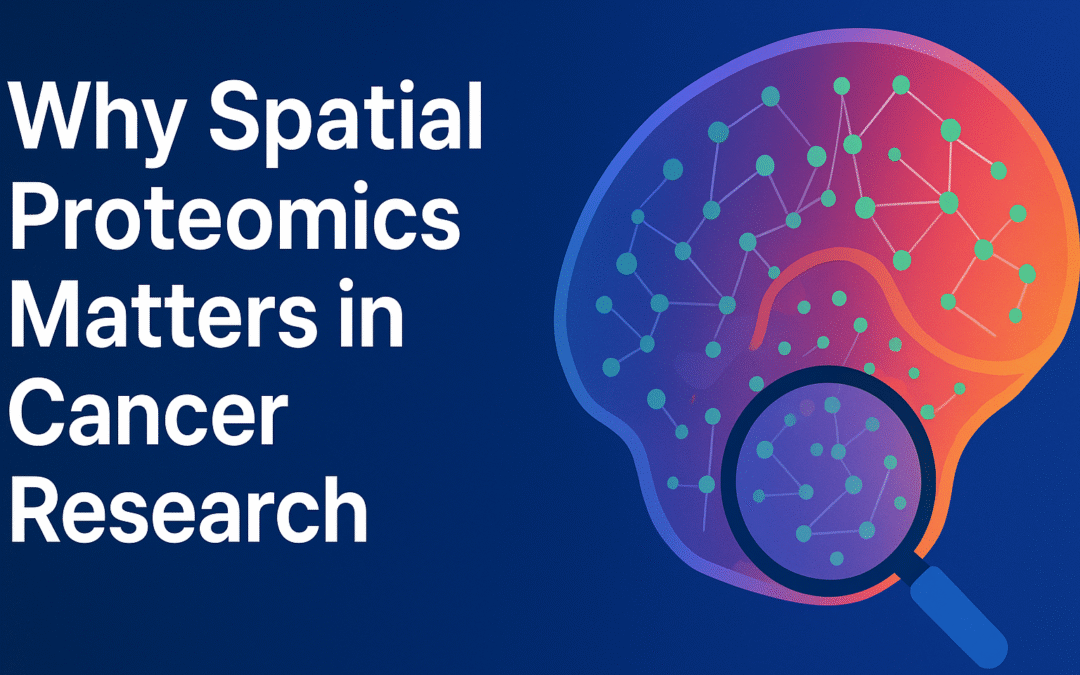Spatial proteomics is a cutting-edge approach in life science research that combines proteomics, the large-scale study of proteins, with spatial resolution. This means researchers can identify, quantify, and map where proteins are located within specific regions of tissues or cells.
By understanding not just which proteins are present but also where they are active, spatial proteomics offers unprecedented insight into protein location, cellular functions and disease mechanisms.
Why Spatial Proteomics Matters in Cancer Research
Cancer is not just a disease of uncontrolled cell growth, it is a spatially complex and dynamic ecosystem. Tumors are made up of diverse cell populations that interact with their microenvironment in specific and often unpredictable ways.
Traditional proteomics which involves homogenizing an entire tissue and then analyzing the homogenate, may miss the spatial information that is critical to your research. With spatial proteomics, researchers can:
- Precisely determine the region where the protein is expressed
- Monitor protein expression changes across tumor zones (core vs. invasive edge)
- Understand cell–cell interactions in the tumor microenvironment
- Validate therapeutic targets with precise spatial resolution
This level of detail is vital for accurate targeting, biomarker discovery, and drug development.
ITSI Biosciences’ Approach to Spatial Proteomics
At ITSI Biosciences, we offer an integrated spatial proteomics workflow to support researchers working on cancer and other complex diseases. Depending on the objective and design, our services can combine:
- Laser Capture Microdissection (LCM): We can analyze precisely isolated specific cell populations or tissue regions collected under direct microscopic visualization. This ensures that only relevant areas, such as tumor vs. surrounding stroma, are selected and analyzed by mass spectrometry.
- Immunodetection (e.g., Immunohistochemistry, Immunofluorescence): Enables visualization and localization of protein targets in tissue sections, guiding microdissection and validating findings with antibody-based detection.
- Mass Spectrometry-Based Proteomics: Following LCM and digestion (optimized using our ProDM – Protein Digestion Monitoring Kit), we employ high-resolution LC-MS/MS to identify and quantify proteins from micro dissected samples.
- Our ProFEK – Protein Fraction Enrichment Kit which can allow subcellular fractionation to gain even deeper spatial insight into protein localization.
Supporting Cancer Biomarker Discovery & Validation
Our spatial proteomics platform allows researchers to:
- Identify candidate biomarkers unique to tumor regions
- Differentiate between disease stages based on proteomic profiles
- Validate therapeutic targets with precise spatial context
- Develop companion diagnostics based on protein expression patterns
Whether you are exploring new targets or validating known biomarkers, ITSI Biosciences provides the expertise, tools, and services to accelerate your discovery pipeline.
Room Temperature-Stable Kits | Affordable. Accurate. Easy-to-Use.
All ITSI kits, including ProFEK and ProDM, are room temperature stable, making them cost-effective to ship and store, without compromising performance.
Let’s Work Together
Have a cancer biomarker project in mind? Can spatial proteomics help your research? We’re here to help.
Contact us at: itsi@itsibio.com
Visit: www.itsibio.com


